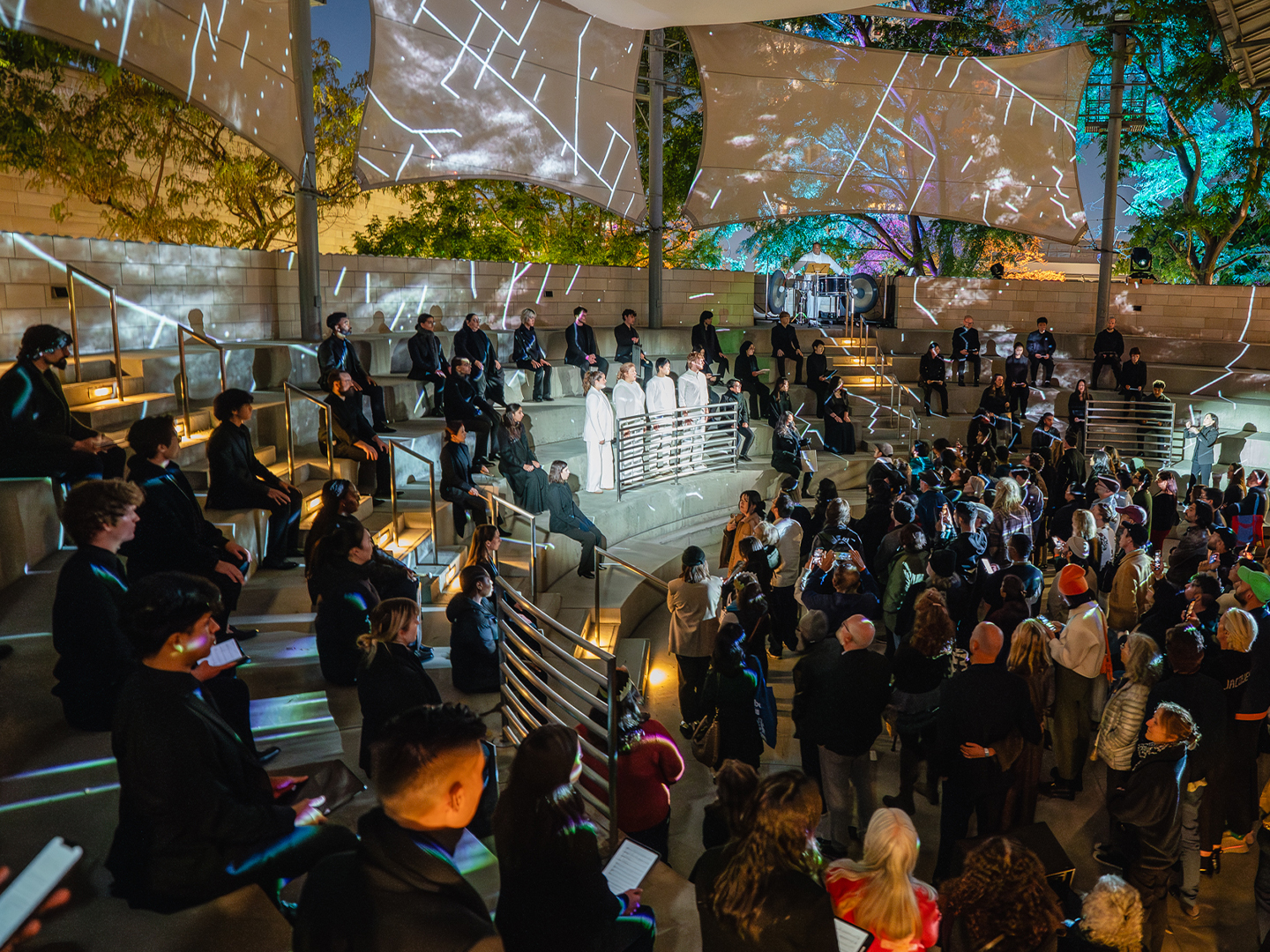
Voices of Thornton at the LA Phil
By Mia Arevalo
The USC Thornton Chamber Singers shine at LA Phil’s Noon to Midnight festival of new music.
On the evening of November 16, 2024, the LA Phil transformed the Walt Disney Concert Hall campus into a sonic playground for its annual 12-hour Noon to Midnight festival. Curated by Pulitzer Prize-winning composer Ellen Reid, the event, subtitled “Field Recordings,” highlighted the ways in which art, technology and nature interact with each other, inviting the audience to engage in “deeper forms of listening.” At the center of Reid’s choral work “Oscillations” was the USC Thornton Chamber Singers, conducted by USC Thornton Choral & Sacred Music faculty member Tram Sparks. Together, the Thornton choir joined an array of L.A.-based artists for a percussive musical experience you can only find in Los Angeles.
As its namesake would suggest, this year’s festival centered on the creative use of field recordings – audio snapshots of natural and urban environments – as tools for healing, expression and joy. The Thornton Chamber Singers contributed to this vision with a collaborative performance tying together live vocals, projections designed by Hana S. Kim and Keith Skretch, and ambient noise into a tribute to Los Angeles.
“My role as a conductor was to guide the pacing and dramatic arc, while facilitating and inviting details like motivic cues and entrances to their places within the ‘scene,’” explained Tram Sparks, emphasizing how Ellen Reid’s vision demanded artistic integration: “Ambient sounds of nature and the city became part of the sonic experience…part of the Gesamtkunstwerk.”
One of the many students who participated in the performance was fifth-year music and economics student and tenor soloist Andrew Powell. Reflecting on the experience, he emphasized its communal power: “Art isn’t exclusive, it expands. Specifically with music, art is not confined to the notes on the page. Each time we went through that song [“Oscillations”], there was something a little different. I think that’s what’s most important about performance, especially in a live setting and in an outdoor setting.”
The immersive quality of “Oscillations” defied expectations. Powell recalled, “It was supposed to be a continuous hour-long piece, but everyone was so enthralled by what was going on, looking at the projections and seeing how both the visual and auditory media interacted with each other…People weren’t leaving, so they had to stop the performance halfway through and get people to usher out and bring more people in.”
Noon to Midnight’s theme of “field recordings” resonated with Powell, who described how technology has revolutionized his approach to music. “With new technology, we’re able to record ourselves and line our own melodies up with our own voices,” he remarked. “Being able to hear myself sing and harmonize in that regard has really opened up creativity for me.” Digital tools have become indispensable to his artistry, and the same can be said for many other students working with similar technology at USC Thornton, from classical to pop to early music.
Working directly with composer Ellen Reid, who curated this year’s festival, left a lasting impact on Powell. Her feedback during rehearsals for “Oscillations,” a piece blending choral harmonies with experimental textures, helped him refine his artistry. “The most exciting thing was definitely getting to do it in front of Ellen,” recalled Powell. “Having her direction there, having her critique and say, ‘Okay, that’s not quite working. Let’s do something else.’ And have her vision come into focus while being able to be a part of that…it made me have a feeling of purpose in that setting.”
“Oscillations” reimagined choral tradition by incorporating silences as part of its language. “We had to find meaning in the silences,” Tram Sparks said, describing how ambient noise and projections shaped the piece’s sonic drama. For her, the artform’s future lies in collaboration: “Choral music doesn’t exist without intertwining voices.” This ethos transformed the performance into what critic Mark Swed called a “love letter to L.A.,” proof that live music’s connection, not its perfection, defines its power.
Noon to Midnight: Field Recordings was about more than just music, it was about community. For the USC Thornton Chamber Singers, the event presented a unique opportunity to breathe new life into choir music and prove that it can be bold and adventurous. Instead of hiding from the city noise surrounding them, the choir leaned into it. As the last notes faded after the clock struck midnight, one thing was clear: Choral music isn’t stuck in the past—It’s alive, breathing with the rhythm of the city and the people who call it home.
Photo(s) by Farah Sosa, courtesy of the LA Phil.







